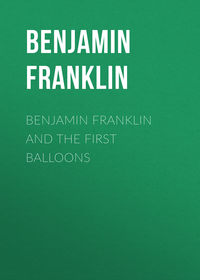![Memoirs of Benjamin Franklin; Written by Himself. [Vol. 2 of 2]](/covers_330/24858395.jpg) полная версия
полная версияMemoirs of Benjamin Franklin; Written by Himself. [Vol. 2 of 2]
"I have mentioned that the contest is likely to be revived. It is on this occasion: in the same session with the stamp-act, an act was passed to regulate the quartering of soldiers in America: when the bill was first brought in, it contained a clause empowering the officers to quarter their soldiers in private houses; this we warmly opposed, and got it omitted. The bill passed, however, with a clause that empty houses, barns, &c., should be hired for them; and that the respective provinces where they were should pay the expense, and furnish firing, bedding, drink, and some other articles to the soldiers, gratis. There is no way for any province to do this but by the Assembly's making a law to raise the money. Pennsylvania Assembly has made such a law; New-York Assembly has refused to do it; and now all the talk here is, of sending a force to compel them.
"The reasons given by the Assembly to the governor for the refusal are, that they understand the act to mean the furnishing such things to soldiers only while on their march through the country, and not to great bodies of soldiers, to be fixed, as at present, in the province; the burden in the latter case being greater than the inhabitants can bear; that it would put it in the power of the captain-general to oppress the province at pleasure, &c. But there is supposed to be another reason at bottom, which they intimate, though they do not plainly express it, to wit, that it is of the nature of an internal tax laid on them by Parliament, which has no right so to do. Their refusal is here called rebellion, and punishment is thought of.
"Now, waving that point of right, and supposing the legislatures in America subordinate to the legislatures of Great Britain, one might conceive, I think, a power in the superior legislature to forbid the inferior legislatures making particular laws; but to enjoin it to make a particular law, contrary to its own judgment, seems improper; an assembly or parliament not being an executive officer of government, whose duty it is, in law-making, to obey orders, but a deliberative body, who are to consider what comes before them, its propriety, practicability, or possibility, and to determine accordingly; the very nature of a parliament seems to be destroyed by supposing it may be bound and compelled by a law of a superior parliament to make a law contrary to its own judgment.
"Indeed, the act of Parliament in question has not, as in other acts, when a duty is enjoined, directed a penalty on neglect or refusal, and a mode of recovering that penalty. It seems, therefore, to the people in America as a requisition, which they are at liberty to comply with or not, as it may suit or not suit the different circumstances of the different provinces. Pennsylvania has, therefore, voluntarily complied. New-York, as I said before, has refused. The ministry that made the act, and all their adherents, call for vengeance. The present ministry are perplexed, and the measures they will finally take on the occasion are yet unknown. But sure I am that if force is used great mischief will ensue, the affections of the people of America to this country will be alienated, your commerce will be diminished, and a total separation of interests be the final consequence.
"It is a common but mistaken notion here, that the colonies were planted at the expense of Parliament, and that, therefore, the Parliament has a right to tax them, &c. The truth is, they were planted at the expense of private adventurers, who went over there to settle, with leave of the king, given by charter. On receiving this leave and those charters, the adventurers voluntarily engaged to remain the king's subjects, though in a foreign country; a country which had not been conquered by either king or parliament, but was possessed by a free people.
"When our planters arrived, they purchased the lands of the natives, without putting king or parliament to any expense. Parliament had no hand in their settlement, was never so much as consulted about their constitution, and took no kind of notice of them till many years after they were established. I except only the two modern colonies, or, rather, attempts to make colonies (for they succeed but poorly, and, as yet, hardly deserve the name of colonies), I mean Georgia and Nova Scotia, which have hitherto been little better than parliamentary jobs. Thus all the colonies acknowledge the king as their sovereign; his governors there represent his person: laws are made by their assemblies or little parliaments, with the governor's assent, subject still to the king's pleasure to affirm or annul them. Suits arising in the colonies, and between colony and colony, are determined by the king in council. In this view they seem so many separate little states, subject to the same prince. The sovereignty of the king is therefore easily understood. But nothing is more common here than to talk of the sovereignty of Parliament, and the sovereignty of this nation over the colonies; a kind of sovereignty, the idea of which is not so clear, nor does it clearly appear on what foundation it is established. On the other hand, it seems necessary, for the common good of the empire, that a power be lodged somewhere to regulate its general commerce; this can be placed nowhere so properly as in the Parliament of Great Britain; and, therefore, though that power has in some instances been executed with great partiality to Britain and prejudice to the colonies, they have nevertheless always submitted to it. Custom-houses are established in all of them, by virtue of laws made here, and the duties instantly paid, except by a few smugglers, such as are here and in all countries; but internal taxes laid on them by Parliament are still, and ever will be, objected to for the reason that you will see in the mentioned examination.
"Upon the whole, I have lived so great a part of my life in Britain, and have formed so many friendships in it, that I love it, and sincerely wish it prosperity; and, therefore, wish to see that union on which alone I think it can be secured and established. As to America, the advantages of such a union to her are not so apparent. She may suffer at present under the arbitrary power of this country; she may suffer for a while in a separation from it; but these are temporary evils which she will outgrow. Scotland and Ireland are differently circumstanced. Confined by the sea, they can scarcely increase in numbers, wealth, and strength, so as to overbalance England. But America, an immense territory, favoured by nature with all advantages of climate, soils, great navigable rivers, lakes, &c., must become a great country, populous and mighty; and will, in a less time than is generally conceived, be able to shake off any shackles that may be imposed upon her, and, perhaps, place them on the imposers. In the mean time, every act of oppression will sour their tempers, lessen greatly, if not annihilate, the profits of your commerce with them, and hasten their final revolt; for the seeds of liberty are universally found there, and nothing can eradicate them. And yet there remains among that people so much respect, veneration, and affection for Britain, that, if cultivated prudently, with a kind usage and tenderness for their privileges, they might be easily governed still for ages, without force or any considerable expense. But I do not see here a sufficient quantity of the wisdom that is necessary to produce such a conduct, and I lament the want of it.
"I borrowed at Millar's the new edition of your Principles of Equity, and have read with great pleasure the preliminary discourse on the principles of morality. I have never before met with anything so satisfactory on the subject. While reading it, I made a few remarks as I went along. They are not of much importance, but I send you the paper.
"I know the lady you mention (Mrs. Montague), having, when in England before, met her once or twice at Lord Bath's. I remember I then entertained the same opinion of her that you express. On the strength of your recommendation, I purpose soon to wait on her.
"This is unexpectedly grown a long letter. The visit to Scotland and the Art of Virtue we will talk of hereafter. It is now time to say that I am, with increasing esteem and affection,
"B. Franklin."14"Lord Kames"London, February 21, 1769."My dear Friend,
"I received your excellent paper on the preferable use of oxen in agriculture, and have put it in the way of being communicated to the public here. I have observed in America that the farmers are more thriving in those parts of the country where horned cattle are used, than in those where the labour is done by horses. The latter are said to require twice the quantity of land to maintain them and, after all, are not good to eat – at least we don't think them so. Here is a waste of land that might afford subsistence for so many of the human species. Perhaps it was for this reason that the Hebrew lawgiver, having promised that the children of Israel should be as numerous as the sands of the sea, not only took care to secure the health of individuals by regulating their diet, that they might be better fitted for producing children, but also forbid their using horses, as those animals would lessen the quantity of subsistence for man. Thus we find, when they took any horses from their enemies, they destroyed them; and in the commandments, where the labour of the ox and ass is mentioned, and forbidden on the Sabbath, there is no mention of the horse, probably because they were to have none. And by the great armies suddenly raised in that small territory they inhabited, it appears to have been very full of people.15
"Food is always necessary to all, and much the greatest part of the labour of mankind is employed in raising provisions for the mouth. Is not this kind of labour, then, the fittest to be the standard by which to measure the values of all other labour, and, consequently, of all other things whose value depends on the labour of making or procuring them? may not even gold and silver be thus valued? If the labour of the farmer, in producing a bushel of wheat, be equal to the labour of the miner in producing an ounce of silver, will not the bushel of wheat just measure the value of the ounce of silver. The miner must eat; the farmer, indeed, can live without the ounce of silver, and so, perhaps, will have some advantage in settling the price. But these discussions I leave to you, as being more able to manage them: only, I will send you a little scrap I wrote some time since on the laws prohibiting foreign commodities.
"I congratulate you on your election as president of your Edinburgh Society. I think I formerly took notice to you in conversation, that I thought there had been some similarity in our fortunes and the circumstances of our lives. This is a fresh instance, for by letters just received I find that I was about the same time chosen President of our American Philosophical Society, established at Philadelphia.16
"I have sent by sea, to the care of Mr. Alexander a little box containing a few copies of the late edition of my books, for my friends in Scotland. One is directed for you, and one for your society, which I beg that you and they would accept as a small token of my respect.
"With the sincerest esteem and regard,
"B. Franklin."P.S. – I am sorry my letter of 1767, concerning the American disputes, miscarried. I now send you a copy of it from my book. The examination mentioned in it you have probably seen. Things daily wear a worse aspect, and tend more and more to a breach and final separation."
"John Alleyne"Craven-street, August 9, 1768."Dear Jack,
"You desire, you say, my impartial thoughts on the subject of an early marriage, by way of answer to the numberless objections that have been made by numerous persons to your own. You may remember, when you consulted me on the occasion, that I thought youth on both sides to be no objection. Indeed, from the marriages that have fallen under my observation, I am rather inclined to think that early ones stand the best chance of happiness. The temper and habits of the young are not yet become so stiff and uncomplying as when more advanced in life; they form more easily to each other, and hence many occasions of disgust are removed. And if youth has less of that prudence which is necessary to manage a family, yet the parents and elder friends of young married persons are generally at hand to afford their advice, which amply supplies that defect; and, by early marriage, youth is sooner formed to regular and useful life; and possibly some of those accidents or connexions, that might have injured the constitution or reputation, or both, are thereby happily prevented. Particular circumstances of particular persons may possibly, sometimes, make it prudent to delay entering into that state; but, in general, when nature has rendered our bodies fit for it, the presumption is in nature's favour, for she has not judged amiss in making us desire it. Late marriages are often attended, too, with this farther inconvenience, that there is not the same chance that the parents shall live to see their offspring educated. 'Late children,' says the Spanish proverb, 'are early orphans.' A melancholy reflection to those whose case it may be! With us in America marriages are generally in the morning of life; our children are therefore educated and settled in the world by noon; and thus, our business being done, we have an afternoon and evening of cheerful leisure to ourselves, such as our friend at present enjoys. By these early marriages we are blessed with more children; and from the mode among us, founded by nature, of every mother suckling and nursing her own child, more of them are raised. Thence the swift progress of population among us, unparalleled in Europe. In fine, I am glad you are married, and congratulate you most cordially upon it. You are now in the way of becoming a useful citizen; and you have escaped the unnatural state of celibacy for life – the fate of many here who never intended it, but who, having too long postponed the change of their condition, find at length that it is too late to think of it, and so live all their lives in a situation that greatly lessens a man's value. An odd volume of a set of books bears not the value of its proportion to the set: what think you of the odd half of a pair of scissors? it can't well cut anything; it may possibly serve to scrape a trencher.
"Pray make my compliments and best wishes acceptable to your bride. I am old and heavy, or I should, ere this, have presented them in person. I shall make but small use of the old man's privilege, that of giving advice to younger friends. Treat your wife always with respect; it will procure respect to you, not only from her, but from all that observe it. Never use a slighting expression to her, even in jest; for slights in jest, after frequent bandyings, are apt to end in angry earnest. Be studious in your profession, and you will be learned. Be industrious and frugal, and you will be rich. Be sober and temperate, and you will be healthy. Be in general virtuous, and you will be happy. At least, you will, by such conduct, stand the best chance for such consequences.
"I pray God to bless you both, being ever your affectionate friend,
"B. Franklin.""Governor Franklin"London, Dec. 19, 1767."Dear Sir,
"The resolutions of the Boston people concerning trade make a great noise here. Parliament has not yet taken notice of them, but the newspapers are in full cry against America. Colonel Onslow told me at court last Sunday, that I could not conceive how much the friends of America were run upon and hurt by them, and how much the Grenvillians triumphed. I have just written a paper for next Thursday's Chronicle, to extenuate matters a little.
"Mentioning Colonel Onslow reminds me of something that passed at the beginning of this session in the house between him and Mr. Grenville. The latter had been raving against America, as traitorous, rebellious, &c., when the former, who has always been its firm friend, stood up and gravely said, that in reading the Roman history, he found it was a custom among that wise and magnanimous people, whenever the senate was informed of any discontent in the provinces, to send two or three of their body into the discontented provinces to inquire into the grievances complained of, and report to the senate, that mild measures might be used to remedy what was amiss before any severe steps were taken to enforce obedience. That this example he thought worthy our imitation in the present state of our colonies, for he did so far agree with the honourable gentleman that spoke just before him as to allow there were great discontents among them. He should therefore beg leave to move, that two or three members of Parliament be appointed to go over to New-England on this service. And that it might not be supposed he was for imposing burdens on others that he would not be willing to bear himself, he did at the same time declare his own willingness, if the house should think fit to appoint them, to go over thither with that honourable gentleman. Upon this there was a great laugh, which continued some time, and was rather increased by Mr. Grenville's asking, 'Will the gentleman engage that I shall be safe there? Can I be assured that I shall be allowed to come back again to make the report?' As soon as the laugh was so far subsided as that Mr. Onslow could be heard again, he added, 'I cannot absolutely engage for the honourable gentleman's safe return; but if he goes thither upon this service, I am strongly of opinion the event will contribute greatly to the future quiet of both countries.' On which the laugh was renewed and redoubled.
"If our people should follow the Boston example in entering into resolutions of frugality and industry, full as necessary for us as for them, I hope they will, among other things, give this reason, that 'tis to enable them more speedily and effectually to discharge their debts to Great Britain; this will soften a little, and, at the same time, appear honourable, and like ourselves. Yours, &c.,
"B. Franklin.""To Dr. Priestley"Passy, June 7, 1782."Dear Sir,
"I received your kind letter of the 7th April, also one of the 3d of May. I have always great pleasure in hearing from you, in learning that you are well, and that you continue your experiments. I should rejoice much if I could once more recover the leisure to search with you into the works of nature; I mean the inanimate or moral part of them: the more I discovered of the former, the more I admired them; the more I know of the latter, the more I am disgusted with them. Men I find to be a sort of beings very badly constructed, as they are generally more easily provoked than reconciled, more disposed to do mischief to each other than to make reparation, much more easily deceived than undeceived, and having more pride and even pleasure in killing than in begetting one another. * * * In what light we are viewed by superior beings, may be gathered from a piece of late West India news, which, possibly, has not yet reached you. A young angel being sent down to this world on some business for the first time, had an old courier-spirit assigned him as a guide; they arrived over the seas of Martinico, in the middle of the long day of obstinate fight between the fleets of Rodney and De Grasse. When through the clouds of smoke he saw the fire of the guns, the decks covered with mangled limbs, and bodies dead or dying, the ships sinking, burning, or blown into the air, and the quantity of pain, misery, and destruction, the crews yet alive were thus with so much eagerness dealing round to one another, he turned angrily to his guide, and said, you blundering blockhead, you are ignorant of your business; you undertook to conduct me to the earth, and you have brought me into hell! No, sir, says the guide, I have made no mistake; this is really the earth, and these are men. Devils never treat one another in this cruel manner; they have more sense, and more of what men (vainly) call humanity.
"But to be serious, my dear old friend, I love you as much as ever, and I love all the honest souls that meet at the London Coffee-house. I only wonder how it happened that they and my other friends in England came to be such good creatures in the midst of so perverse a generation. I long to see them and you once more, and I labour for peace with more earnestness, that I may again be happy in your sweet society. * * *
"Yesterday the Count du Nord17 was at the Academy of Sciences, when sundry experiments were exhibited for his entertainment; among them, one by M. Lavoisier, to show that the strongest fire we yet know is made in charcoal blown upon with dephlogisticated air. In a heat so produced, he melted platina presently, the fire being much more powerful than that of the strongest burning mirror. Adieu, and believe me ever, yours most affectionately,
B. Franklin."To the same"London, September 19, 1772."Dear Sir,
"In the affair of so much importance to you, wherein you ask my advice, I cannot, for want of sufficient premises, counsel you what to determine; but, if you please, I will tell you how. When those difficult cases occur, they are difficult chiefly because, while we have them under consideration, all the reasons, pro and con, are not present to the mind at the same time; but sometimes one set present themselves, and at other times another, the first being out of sight. Hence the various purposes or inclinations that alternately prevail, and the uncertainty that perplexes us. To get over this, my way is, to divide half a sheet of paper by a line into two columns, writing over the one pro and over the other con: then, during three or four days' consideration, I put down under the different heads short hints of the different motives that at different times occur to me for or against the measure. When I have thus got them all together in one view, I endeavour to estimate their respective weights, and where I find two (one on each side), that seem equal, I strike them both out. If I find a reason pro equal to some two reasons con I strike out the three. If I judge some two reasons con equal to some three reasons pro, I strike out the five; and, thus proceeding, I find at length where the balance lies; and if, after a day or two of farther consideration, nothing new that is of importance occurs on either side, I come to a determination accordingly. And though the weight of reasons cannot be taken with the precision of algebraic quantities, yet, when each is thus considered separately and comparatively, and the whole lies before me, I think I can judge better, and am less liable to make a rash step; and, in fact, I have found great advantage from this kind of equation, in what may be called moral or prudential algebra.
"Wishing sincerely that you may determine for the best, I am ever, my dear friend, yours most affectionately,
B. Franklin.""Mr. Mather, Boston"London, July, 4, 1773."Reverend Sir,
"The remarks you have added on the late proceedings against America are very just and judicious; and I cannot see any impropriety in your making them, though a minister of the gospel. This kingdom is a good deal indebted for its liberties to the public spirit of its ancient clergy, who joined with the barons in obtaining Magna Charta, and joined heartily in forming the curses of excommunication against the infringers of it. There is no doubt but the claim of Parliament, of authority to make laws binding on the colonies in all cases whatsoever, includes an authority to change our religious constitution, and establish popery or Mohammedanism, if they please, in its stead; but, as you intimate, power does not infer right; and as the right is nothing and the power (by our increase) continually diminishing, the one will soon be as insignificant as the other. You seem only to have made a small mistake in supposing they modestly avoided to declare they had a right, the words of the act being, 'that they have, and of right ought to have, full power,' &c.
"Your suspicion that sundry others besides Governor Bernard 'had written hither their opinions and councils, encouraging the late measures to the prejudice of our country, which have been too much needed and followed,' is, I apprehend, but too well founded. You call them 'traitorous individuals,' whence I collect that you suppose them of our own country. There was among the twelve apostles one traitor, who betrayed with a kiss. It should be no wonder, therefore, if among so many thousand true patriots as New-England contains, there should be found even twelve Judases ready to betray their country for a few paltry pieces of silver. Their ends, as well as their views, ought to be similar. But all the oppressions evidently work for our good. Providence seems by every means intent on making us a great people. May our virtues, public and private, grow with us and be durable, that liberty, civil and religious, may be secured to our posterity, and to all from every part of the Old World that take refuge among us.


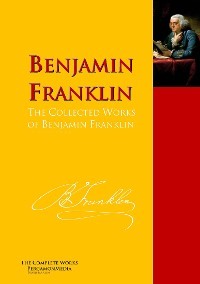
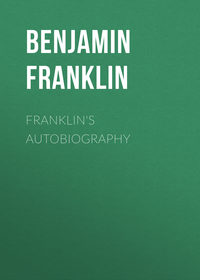
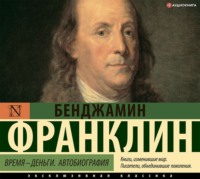

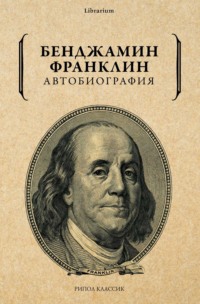
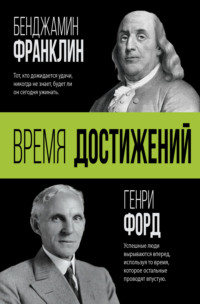
![Memoirs of Benjamin Franklin; Written by Himself. [Vol. 1 of 2]](/covers_200/24858139.jpg)
